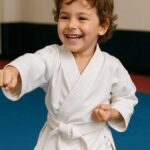Introduction
Table of Contents
Every child is unique. Some are outgoing and adventurous, while others may feel more reserved or hesitant in social situations. If your child is shy, you’ve probably wondered how to help them build confidence, make friends, and feel comfortable in their own skin.
This is where martial arts can play a powerful role. Far from just teaching punches and kicks, the best martial art for shy kids can unlock hidden confidence, encourage self-expression, and nurture personal growth.
For parents, the challenge is figuring out which martial art is best suited for a shy child’s personality and needs. The good news? Many martial arts styles are designed to help children flourish in a supportive, structured environment.
Let’s explore the benefits, risks, and practical advice for helping your shy child thrive through martial arts.

What Does “Best Martial Art for Shy Kids” Mean?
When we talk about the “best” martial art for shy kids, it doesn’t just mean the one that teaches the most techniques. Instead, it’s about finding a style that:
- Encourages confidence building
- Promotes teamwork and social interaction
- Offers a safe, supportive environment
- Matches your child’s comfort level and personality
Unlike competitive sports, martial arts emphasize personal growth and self-control, making them a great choice for children who may feel shy or anxious in group settings.
1. Boosts Confidence
Shy kids often feel nervous in new situations, but martial arts gives them small, achievable goals like learning a move or earning a belt. Each accomplishment builds their self-esteem step by step. Over time, this steady progress helps them feel more confident both in class and outside of it.
2. Improves Social Skills
Martial arts classes create a friendly group environment where children practice together. Partner drills and team activities allow shy kids to connect without pressure. Slowly, they learn how to interact, share, and communicate with others in a natural way.
3. Encourages Self-Expression
Martial arts let children express themselves through movement instead of words. Shy kids often find this easier and more comfortable than speaking up. As they grow more confident in class, this self-expression carries over into school, home, and friendships.
4. Teaches Respect and Discipline
Respect is a core value in martial arts—students bow to instructors, listen carefully, and follow class rules. For shy kids, this structure provides a safe, predictable environment. It helps them feel secure while also teaching discipline and responsibility.
5. Builds Resilience
Trying something new can feel scary for shy children. Martial arts encourage them to step outside their comfort zone in small, manageable ways. With each challenge they overcome, they learn persistence and resilience, building strength not just physically, but emotionally too.
Possible Concerns for Parents
It’s natural for parents to feel cautious. Here are a few concerns you might have—and the truth behind them:
- “Will my shy child feel overwhelmed?”
Reputable martial arts schools start beginners at a slow, comfortable pace. Instructors are trained to work with shy personalities. - “Is martial arts too aggressive?”
Most programs for kids emphasize defense, discipline, and self-control—not fighting. - “Will my child be safe?”
Safety is a top priority. Schools use padded floors, controlled movements, and age-appropriate training. - “What if my child wants to quit?”
Many shy children need extra encouragement at first. Parents can help by celebrating small wins and supporting consistent attendance.
Safety Tips for Shy Kids in Martial Arts
To make martial arts a positive experience, follow these best practices:
- Choose the right school
Not all martial arts schools are the same. Visit in person, watch how instructors interact with kids, and notice whether they are patient, encouraging, and respectful. A positive environment makes shy children feel safe and supported.
- Start with trial classes
Many schools offer free or low-cost trial sessions. This gives your child a chance to explore the class without commitment and see if they feel comfortable. It also helps you gauge how well the instructor connects with them.
- Pick the right martial art style
Some martial arts are high-energy and competitive, while others are calm and structured. For shy kids, choosing a style that matches their personality—like Karate for structure or Aikido for gentleness—can make a big difference.
- Set realistic expectations
Shy children may need extra time to adjust. Don’t expect overnight confidence or quick belt promotions. Celebrate small wins and let your child progress at their own pace without added pressure.
- Communicate with the instructor
Always let the instructor know if your child is shy or nervous. Good teachers will adapt their approach, give extra encouragement, and ensure your child feels included without being pushed too hard.
Which Martial Arts Are Best for Shy Kids?
Not all martial arts are the same. Here’s a breakdown of the top options for shy children:
1. Karate
Karate is one of the most structured martial arts, focusing on discipline, respect, and controlled movements. The step-by-step belt system helps shy kids set small goals and feel proud of their progress. Its clear routines provide a sense of safety and predictability, which is especially reassuring for reserved children.
2. Taekwondo
Known for its exciting kicks and energetic classes, Taekwondo keeps kids active while boosting confidence. The lively atmosphere encourages shy children to step out of their shell and enjoy teamwork. Over time, the fun and dynamic training helps them become more expressive and outgoing.
3. Judo
Judo emphasizes balance, throws, and working closely with a partner. This partner-based approach helps shy kids build trust, cooperation, and respect for others. Since it relies on teamwork, it naturally supports social growth and helps kids connect with classmates.
4. Brazilian Jiu-Jitsu (BJJ)
BJJ focuses on ground defense and problem-solving, teaching kids to use strategy rather than strength. For shy children, it offers small but meaningful victories that quickly build self-confidence. The gentle, step-by-step learning process also helps them develop patience and resilience.
5. Aikido
Aikido is a non-aggressive martial art centered on harmony and self-defense without hurting others. Its calm, flowing movements make it a great choice for shy kids who may feel uneasy with rough contact. This gentle style helps them grow confidence while feeling safe and respected.
Comparison Table: Martial Arts for Shy Kids
| Martial Art | Main Focus | Best Benefit for Shy Kids | Recommended Age |
|---|---|---|---|
| Karate | Discipline & basics | Builds structure & self-esteem | 5+ |
| Taekwondo | Kicks & fitness | Boosts energy & confidence | 5+ |
| Judo | Throws & teamwork | Encourages trust & cooperation | 6+ |
| Brazilian Jiu-Jitsu | Ground defense & strategy | Develops problem-solving & resilience | 7+ |
| Aikido | Defense without aggression | Gentle & calming for shy children | 6+ |

Conclusion
Shyness is not a weakness—it’s simply part of your child’s personality. With the right support, your shy child can flourish and gain confidence through martial arts.
Whether it’s Karate, Taekwondo, Judo, BJJ, or Aikido, the best martial art for shy kids is the one that fits their comfort level and helps them grow step by step.
As a parent, your role is to guide, encourage, and celebrate every small achievement along the way. With patience and the right martial arts program, your child can discover inner strength and shine in ways you never imagined.
FAQs About Martial Arts for Shy Kids
1. Will martial arts make my shy child more aggressive?
No. Martial arts teach discipline and self-control, not aggression.
2. What age should my shy child start martial arts?
Most schools accept children as young as 5, but 6–7 is often the sweet spot.
3. How long before I see changes in my child’s confidence?
Many parents notice improvements in just a few months of consistent training.
4. What if my child refuses to participate at first?
It’s common. Be patient, and let the instructor encourage them gently.
5. Which martial art is the easiest for beginners?
Karate and Taekwondo are often the best starting points for shy kids.


